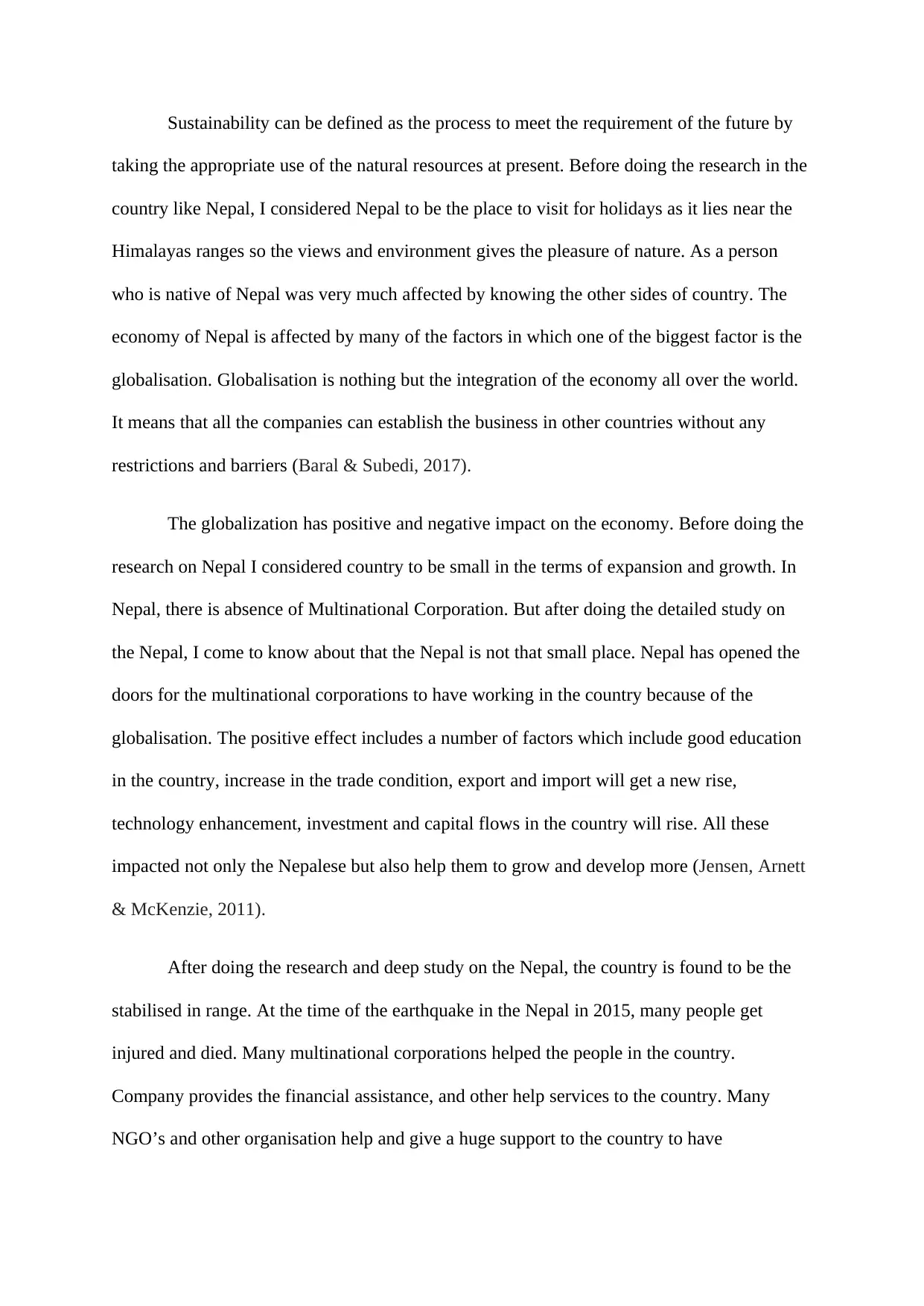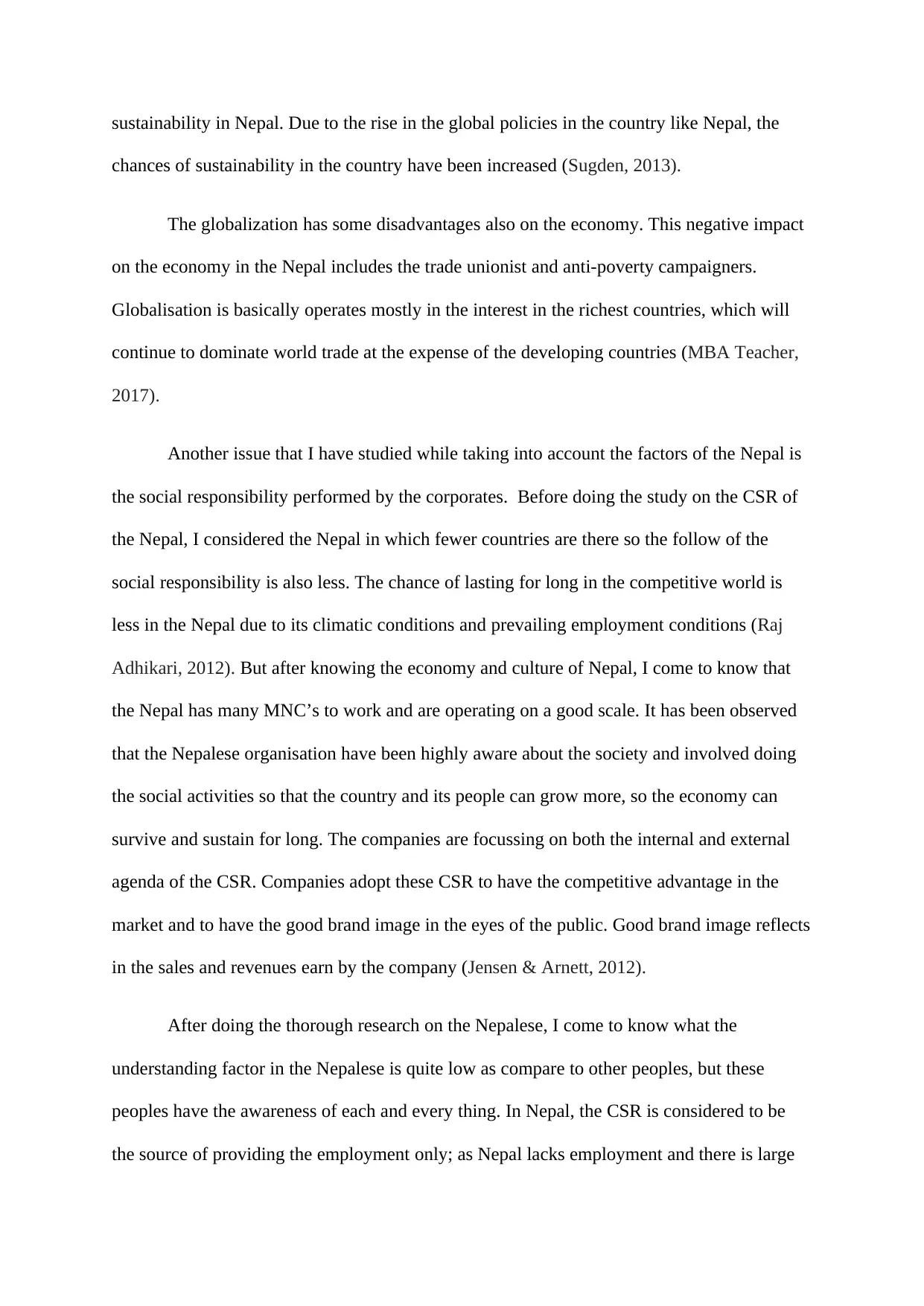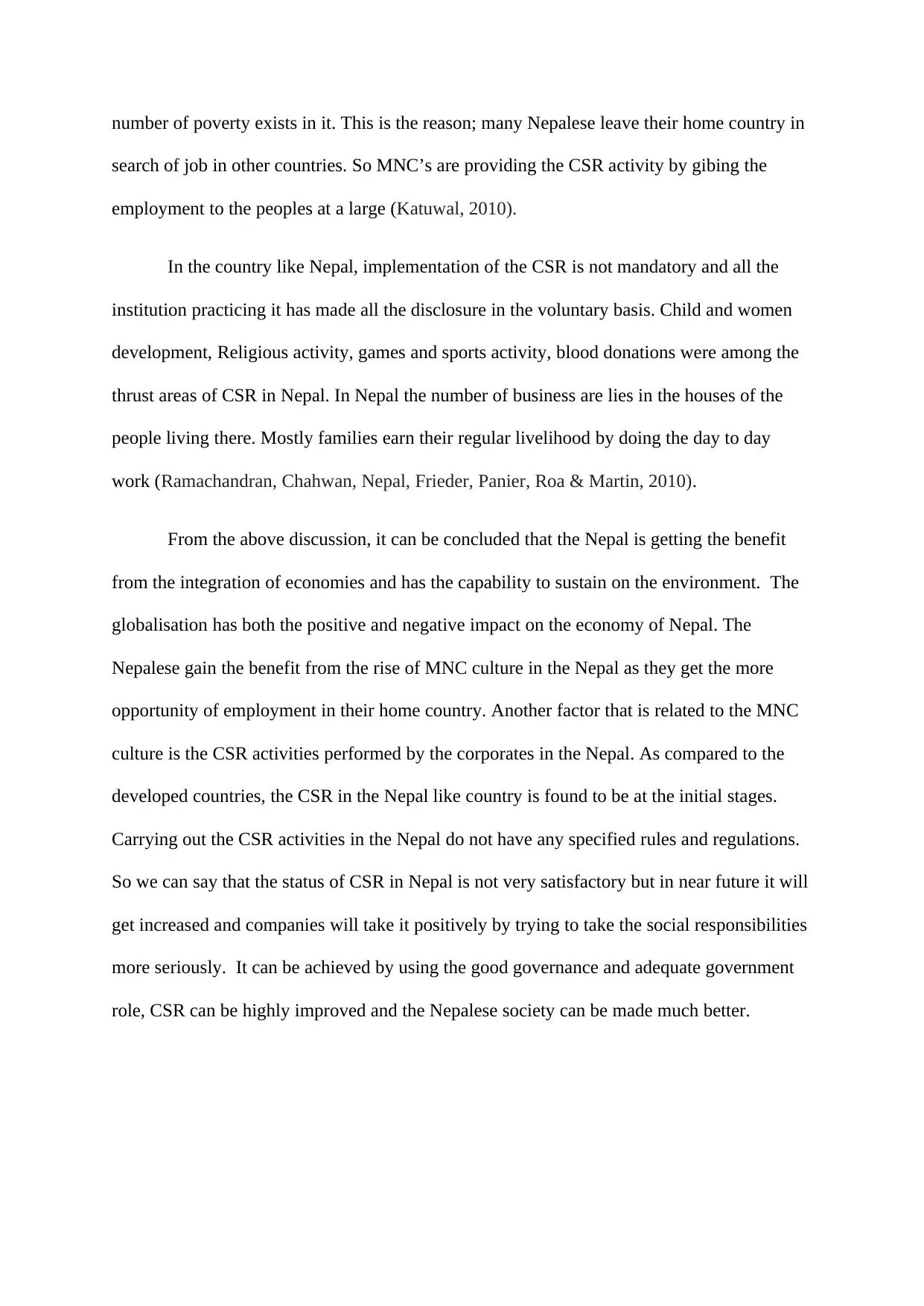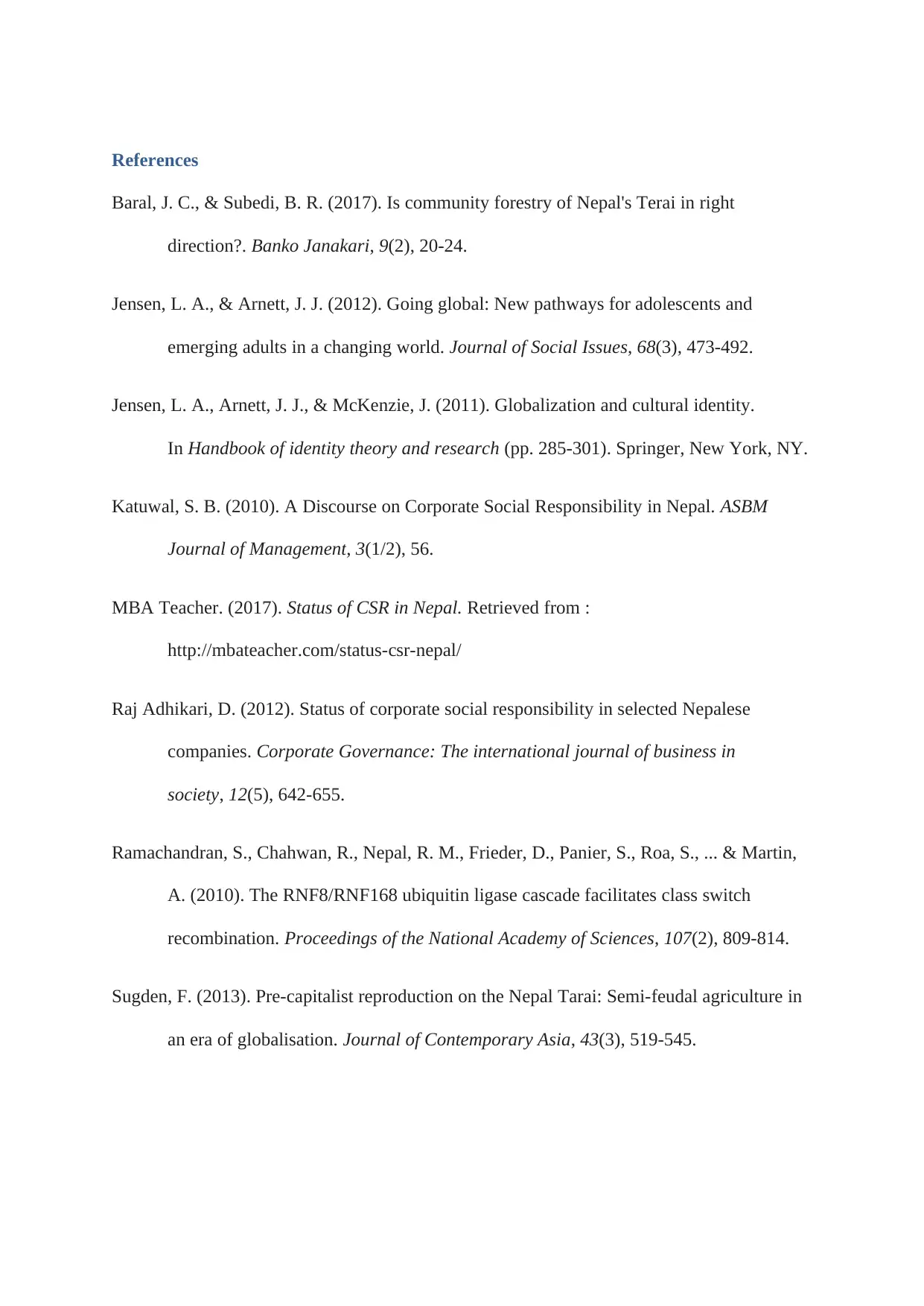Reflective Journal: Principle of Responsible Business Essay
VerifiedAdded on 2023/06/11
|5
|1452
|292
Journal and Reflective Writing
AI Summary
This reflective essay explores the principle of responsible business, focusing on sustainability and its impact on Nepal's economy. The author reflects on their initial perceptions of Nepal before conducting research, highlighting the effects of globalization, including both positive aspects like increased trade and technology enhancement, and negative aspects such as the dominance of richer countries. The essay also examines corporate social responsibility (CSR) in Nepal, noting its importance in providing employment and addressing social needs, while also acknowledging the voluntary nature of CSR implementation and the need for improved governance. The reflection concludes that while CSR in Nepal is in its early stages, there is potential for significant improvement through better governance and a stronger commitment from corporations.

qwertyuiopasdfghjklzxcvbnmqw
ertyuiopasdfghjklzxcvbnmqwert
yuiopasdfghjklzxcvbnmqwertyui
opasdfghjklzxcvbnmqwertyuiop
asdfghjklzxcvbnmqwertyuiopasd
fghjklzxcvbnmqwertyuiopasdfgh
jklzxcvbnmqwertyuiopasdfghjkl
zxcvbnmqwertyuiopasdfghjklzxc
vbnmqwertyuiopasdfghjklzxcvb
nmqwertyuiopasdfghjklzxcvbnm
qwertyuiopasdfghjklzxcvbnmqw
ertyuiopasdfghjklzxcvbnmqwert
yuiopasdfghjklzxcvbnmqwertyui
opasdfghjklzxcvbnmqwertyuiop
asdfghjklzxcvbnmqwertyuiopasd
fghjklzxcvbnmqwertyuiopasdfgh
jklzxcvbnmrtyuiopasdfghjklzxcv
Principle Of Responsible Business
Reflective Essay
6/2/2018
Student Name
ertyuiopasdfghjklzxcvbnmqwert
yuiopasdfghjklzxcvbnmqwertyui
opasdfghjklzxcvbnmqwertyuiop
asdfghjklzxcvbnmqwertyuiopasd
fghjklzxcvbnmqwertyuiopasdfgh
jklzxcvbnmqwertyuiopasdfghjkl
zxcvbnmqwertyuiopasdfghjklzxc
vbnmqwertyuiopasdfghjklzxcvb
nmqwertyuiopasdfghjklzxcvbnm
qwertyuiopasdfghjklzxcvbnmqw
ertyuiopasdfghjklzxcvbnmqwert
yuiopasdfghjklzxcvbnmqwertyui
opasdfghjklzxcvbnmqwertyuiop
asdfghjklzxcvbnmqwertyuiopasd
fghjklzxcvbnmqwertyuiopasdfgh
jklzxcvbnmrtyuiopasdfghjklzxcv
Principle Of Responsible Business
Reflective Essay
6/2/2018
Student Name
Paraphrase This Document
Need a fresh take? Get an instant paraphrase of this document with our AI Paraphraser

Sustainability can be defined as the process to meet the requirement of the future by
taking the appropriate use of the natural resources at present. Before doing the research in the
country like Nepal, I considered Nepal to be the place to visit for holidays as it lies near the
Himalayas ranges so the views and environment gives the pleasure of nature. As a person
who is native of Nepal was very much affected by knowing the other sides of country. The
economy of Nepal is affected by many of the factors in which one of the biggest factor is the
globalisation. Globalisation is nothing but the integration of the economy all over the world.
It means that all the companies can establish the business in other countries without any
restrictions and barriers (Baral & Subedi, 2017).
The globalization has positive and negative impact on the economy. Before doing the
research on Nepal I considered country to be small in the terms of expansion and growth. In
Nepal, there is absence of Multinational Corporation. But after doing the detailed study on
the Nepal, I come to know about that the Nepal is not that small place. Nepal has opened the
doors for the multinational corporations to have working in the country because of the
globalisation. The positive effect includes a number of factors which include good education
in the country, increase in the trade condition, export and import will get a new rise,
technology enhancement, investment and capital flows in the country will rise. All these
impacted not only the Nepalese but also help them to grow and develop more (Jensen, Arnett
& McKenzie, 2011).
After doing the research and deep study on the Nepal, the country is found to be the
stabilised in range. At the time of the earthquake in the Nepal in 2015, many people get
injured and died. Many multinational corporations helped the people in the country.
Company provides the financial assistance, and other help services to the country. Many
NGO’s and other organisation help and give a huge support to the country to have
taking the appropriate use of the natural resources at present. Before doing the research in the
country like Nepal, I considered Nepal to be the place to visit for holidays as it lies near the
Himalayas ranges so the views and environment gives the pleasure of nature. As a person
who is native of Nepal was very much affected by knowing the other sides of country. The
economy of Nepal is affected by many of the factors in which one of the biggest factor is the
globalisation. Globalisation is nothing but the integration of the economy all over the world.
It means that all the companies can establish the business in other countries without any
restrictions and barriers (Baral & Subedi, 2017).
The globalization has positive and negative impact on the economy. Before doing the
research on Nepal I considered country to be small in the terms of expansion and growth. In
Nepal, there is absence of Multinational Corporation. But after doing the detailed study on
the Nepal, I come to know about that the Nepal is not that small place. Nepal has opened the
doors for the multinational corporations to have working in the country because of the
globalisation. The positive effect includes a number of factors which include good education
in the country, increase in the trade condition, export and import will get a new rise,
technology enhancement, investment and capital flows in the country will rise. All these
impacted not only the Nepalese but also help them to grow and develop more (Jensen, Arnett
& McKenzie, 2011).
After doing the research and deep study on the Nepal, the country is found to be the
stabilised in range. At the time of the earthquake in the Nepal in 2015, many people get
injured and died. Many multinational corporations helped the people in the country.
Company provides the financial assistance, and other help services to the country. Many
NGO’s and other organisation help and give a huge support to the country to have

sustainability in Nepal. Due to the rise in the global policies in the country like Nepal, the
chances of sustainability in the country have been increased (Sugden, 2013).
The globalization has some disadvantages also on the economy. This negative impact
on the economy in the Nepal includes the trade unionist and anti-poverty campaigners.
Globalisation is basically operates mostly in the interest in the richest countries, which will
continue to dominate world trade at the expense of the developing countries (MBA Teacher,
2017).
Another issue that I have studied while taking into account the factors of the Nepal is
the social responsibility performed by the corporates. Before doing the study on the CSR of
the Nepal, I considered the Nepal in which fewer countries are there so the follow of the
social responsibility is also less. The chance of lasting for long in the competitive world is
less in the Nepal due to its climatic conditions and prevailing employment conditions (Raj
Adhikari, 2012). But after knowing the economy and culture of Nepal, I come to know that
the Nepal has many MNC’s to work and are operating on a good scale. It has been observed
that the Nepalese organisation have been highly aware about the society and involved doing
the social activities so that the country and its people can grow more, so the economy can
survive and sustain for long. The companies are focussing on both the internal and external
agenda of the CSR. Companies adopt these CSR to have the competitive advantage in the
market and to have the good brand image in the eyes of the public. Good brand image reflects
in the sales and revenues earn by the company (Jensen & Arnett, 2012).
After doing the thorough research on the Nepalese, I come to know what the
understanding factor in the Nepalese is quite low as compare to other peoples, but these
peoples have the awareness of each and every thing. In Nepal, the CSR is considered to be
the source of providing the employment only; as Nepal lacks employment and there is large
chances of sustainability in the country have been increased (Sugden, 2013).
The globalization has some disadvantages also on the economy. This negative impact
on the economy in the Nepal includes the trade unionist and anti-poverty campaigners.
Globalisation is basically operates mostly in the interest in the richest countries, which will
continue to dominate world trade at the expense of the developing countries (MBA Teacher,
2017).
Another issue that I have studied while taking into account the factors of the Nepal is
the social responsibility performed by the corporates. Before doing the study on the CSR of
the Nepal, I considered the Nepal in which fewer countries are there so the follow of the
social responsibility is also less. The chance of lasting for long in the competitive world is
less in the Nepal due to its climatic conditions and prevailing employment conditions (Raj
Adhikari, 2012). But after knowing the economy and culture of Nepal, I come to know that
the Nepal has many MNC’s to work and are operating on a good scale. It has been observed
that the Nepalese organisation have been highly aware about the society and involved doing
the social activities so that the country and its people can grow more, so the economy can
survive and sustain for long. The companies are focussing on both the internal and external
agenda of the CSR. Companies adopt these CSR to have the competitive advantage in the
market and to have the good brand image in the eyes of the public. Good brand image reflects
in the sales and revenues earn by the company (Jensen & Arnett, 2012).
After doing the thorough research on the Nepalese, I come to know what the
understanding factor in the Nepalese is quite low as compare to other peoples, but these
peoples have the awareness of each and every thing. In Nepal, the CSR is considered to be
the source of providing the employment only; as Nepal lacks employment and there is large
⊘ This is a preview!⊘
Do you want full access?
Subscribe today to unlock all pages.

Trusted by 1+ million students worldwide

number of poverty exists in it. This is the reason; many Nepalese leave their home country in
search of job in other countries. So MNC’s are providing the CSR activity by gibing the
employment to the peoples at a large (Katuwal, 2010).
In the country like Nepal, implementation of the CSR is not mandatory and all the
institution practicing it has made all the disclosure in the voluntary basis. Child and women
development, Religious activity, games and sports activity, blood donations were among the
thrust areas of CSR in Nepal. In Nepal the number of business are lies in the houses of the
people living there. Mostly families earn their regular livelihood by doing the day to day
work (Ramachandran, Chahwan, Nepal, Frieder, Panier, Roa & Martin, 2010).
From the above discussion, it can be concluded that the Nepal is getting the benefit
from the integration of economies and has the capability to sustain on the environment. The
globalisation has both the positive and negative impact on the economy of Nepal. The
Nepalese gain the benefit from the rise of MNC culture in the Nepal as they get the more
opportunity of employment in their home country. Another factor that is related to the MNC
culture is the CSR activities performed by the corporates in the Nepal. As compared to the
developed countries, the CSR in the Nepal like country is found to be at the initial stages.
Carrying out the CSR activities in the Nepal do not have any specified rules and regulations.
So we can say that the status of CSR in Nepal is not very satisfactory but in near future it will
get increased and companies will take it positively by trying to take the social responsibilities
more seriously. It can be achieved by using the good governance and adequate government
role, CSR can be highly improved and the Nepalese society can be made much better.
search of job in other countries. So MNC’s are providing the CSR activity by gibing the
employment to the peoples at a large (Katuwal, 2010).
In the country like Nepal, implementation of the CSR is not mandatory and all the
institution practicing it has made all the disclosure in the voluntary basis. Child and women
development, Religious activity, games and sports activity, blood donations were among the
thrust areas of CSR in Nepal. In Nepal the number of business are lies in the houses of the
people living there. Mostly families earn their regular livelihood by doing the day to day
work (Ramachandran, Chahwan, Nepal, Frieder, Panier, Roa & Martin, 2010).
From the above discussion, it can be concluded that the Nepal is getting the benefit
from the integration of economies and has the capability to sustain on the environment. The
globalisation has both the positive and negative impact on the economy of Nepal. The
Nepalese gain the benefit from the rise of MNC culture in the Nepal as they get the more
opportunity of employment in their home country. Another factor that is related to the MNC
culture is the CSR activities performed by the corporates in the Nepal. As compared to the
developed countries, the CSR in the Nepal like country is found to be at the initial stages.
Carrying out the CSR activities in the Nepal do not have any specified rules and regulations.
So we can say that the status of CSR in Nepal is not very satisfactory but in near future it will
get increased and companies will take it positively by trying to take the social responsibilities
more seriously. It can be achieved by using the good governance and adequate government
role, CSR can be highly improved and the Nepalese society can be made much better.
Paraphrase This Document
Need a fresh take? Get an instant paraphrase of this document with our AI Paraphraser

References
Baral, J. C., & Subedi, B. R. (2017). Is community forestry of Nepal's Terai in right
direction?. Banko Janakari, 9(2), 20-24.
Jensen, L. A., & Arnett, J. J. (2012). Going global: New pathways for adolescents and
emerging adults in a changing world. Journal of Social Issues, 68(3), 473-492.
Jensen, L. A., Arnett, J. J., & McKenzie, J. (2011). Globalization and cultural identity.
In Handbook of identity theory and research (pp. 285-301). Springer, New York, NY.
Katuwal, S. B. (2010). A Discourse on Corporate Social Responsibility in Nepal. ASBM
Journal of Management, 3(1/2), 56.
MBA Teacher. (2017). Status of CSR in Nepal. Retrieved from :
http://mbateacher.com/status-csr-nepal/
Raj Adhikari, D. (2012). Status of corporate social responsibility in selected Nepalese
companies. Corporate Governance: The international journal of business in
society, 12(5), 642-655.
Ramachandran, S., Chahwan, R., Nepal, R. M., Frieder, D., Panier, S., Roa, S., ... & Martin,
A. (2010). The RNF8/RNF168 ubiquitin ligase cascade facilitates class switch
recombination. Proceedings of the National Academy of Sciences, 107(2), 809-814.
Sugden, F. (2013). Pre-capitalist reproduction on the Nepal Tarai: Semi-feudal agriculture in
an era of globalisation. Journal of Contemporary Asia, 43(3), 519-545.
Baral, J. C., & Subedi, B. R. (2017). Is community forestry of Nepal's Terai in right
direction?. Banko Janakari, 9(2), 20-24.
Jensen, L. A., & Arnett, J. J. (2012). Going global: New pathways for adolescents and
emerging adults in a changing world. Journal of Social Issues, 68(3), 473-492.
Jensen, L. A., Arnett, J. J., & McKenzie, J. (2011). Globalization and cultural identity.
In Handbook of identity theory and research (pp. 285-301). Springer, New York, NY.
Katuwal, S. B. (2010). A Discourse on Corporate Social Responsibility in Nepal. ASBM
Journal of Management, 3(1/2), 56.
MBA Teacher. (2017). Status of CSR in Nepal. Retrieved from :
http://mbateacher.com/status-csr-nepal/
Raj Adhikari, D. (2012). Status of corporate social responsibility in selected Nepalese
companies. Corporate Governance: The international journal of business in
society, 12(5), 642-655.
Ramachandran, S., Chahwan, R., Nepal, R. M., Frieder, D., Panier, S., Roa, S., ... & Martin,
A. (2010). The RNF8/RNF168 ubiquitin ligase cascade facilitates class switch
recombination. Proceedings of the National Academy of Sciences, 107(2), 809-814.
Sugden, F. (2013). Pre-capitalist reproduction on the Nepal Tarai: Semi-feudal agriculture in
an era of globalisation. Journal of Contemporary Asia, 43(3), 519-545.
1 out of 5
Related Documents
Your All-in-One AI-Powered Toolkit for Academic Success.
+13062052269
info@desklib.com
Available 24*7 on WhatsApp / Email
![[object Object]](/_next/static/media/star-bottom.7253800d.svg)
Unlock your academic potential
Copyright © 2020–2025 A2Z Services. All Rights Reserved. Developed and managed by ZUCOL.




